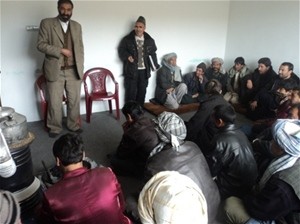
Members of Bamyan Potato Cooperatives attending the capacity building training.
USAID/CBSG
USAID empowers farmers through capacity building programs
22 JUNE 2011 | BAMYAN, AFGHANISTAN
Almost 90 percent of the people of Bamyan Province rely on potato crops as their primary source of income. The province is well-known for its good quality potatoes countrywide. Farmers use traditional farming methods to plant their crops. Recently, a potato growing community in the province established the Potato Cooperative Association, with the aim to unify farmers, increase crop outputs and production, and improve their income.
Lack of resources allocated to the Provincial Department of Agriculture, Irrigation and Livestock has been one of the reasons the local government has been unable to train farmers to increase their capacity and in turn boost their agricultural products. The community requested funding from USAID for a training program as a necessary tool to help discuss agricultural issues and increase production.
Four potato cooperatives in Bamyan Province began offering capacity training programs for the 886 members of the Bamyan Potato Cooperative Association. The government-led capacity building training helped farmers in Bamyan learn new farming methods and increase production.
The training covered areas such as potato planting mechanisms and procedures, data collection, accounting, record keeping, marketing, and literacy to increase the capacity of the association members and develop their skills to better plant, process, and market their harvests.
Mrs. Zakia, one of the training participants and the head of Bamyan Naween Cooperative said, “The training is very important and such programs are vital for raising the awareness of farmers who have long run their businesses in a traditional manner.”
USAID works with community development councils and other eligible grassroots organizations to implement small-scale community-level projects in 14 provinces in the north, west, and central regions of Afghanistan.







Comment
Make a general inquiry or suggest an improvement.